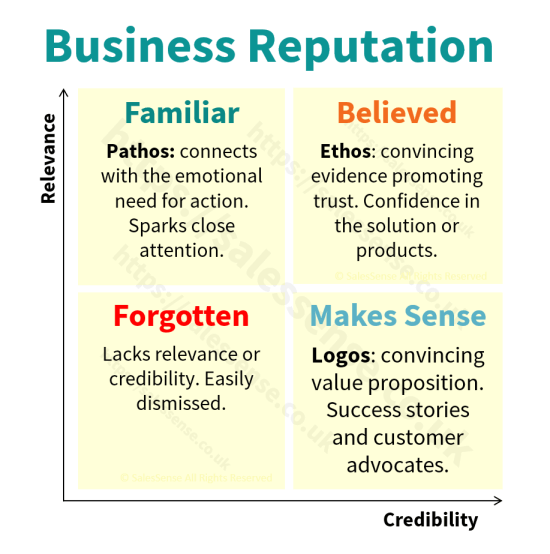Quantifying the business reputation value of what you sell.

Reputation is the thing that powers a business forward. Those without it are doomed to be forever in a start-up phase. What you sell has the potential to add business reputation value.
Do you communicate the business reputation value created by what you sell?
Many things can be connected with improvements in a customer's reputation.
It may not be obvious how sales training, coaching, and consulting on sales matters are connected with a customer's business reputation.
If salespeople know how to resolve the challenges they face in their sales efforts they are likely to make use of their knowledge. The behaviour of salespeople has a substantial impact on business reputation. So the professionalism with which salespeople solve challenges enhances the reputation of a business. The better their training and the behavioural examples set by leaders and managers, the greater a business's reputation becomes.
For example, the manner of a sales approach to a new potential customer communicates the nature of the company that the salesperson represents. The response to a customer's negotiation stance can kill the dialogue, or strengthen the relationship.
Those salespeople who know how to maintain and strengthen relationships in the face of challenges, adversarial behaviours, and even lies, raise their and their employer's reputation.
How does what you sell, improve or protect customer reputation?
What would a 1% reputation increase or decrease translate to in terms of business for your customers?
If you had to score the significance of reputation, on a scale of 1 to 10, how would you score it?
How would your customers score it?
Add a BUSINESS REPUTATION VALUE section to the table that you started.
Share your conclusions about the value of the reputation increase associated with what you sell in the comments or send it to me for feedback:
Free B2B Sales Training Course Index
What is an autodidact?
An autodidact is a self-taught person, meaning they acquire knowledge or skills through their own efforts without formal instruction or education. Autodidacts take initiative in their learning, often driven by curiosity, passion, or a specific goal, and use a variety of resources such as books, online courses, videos, and practice to teach themselves. They may explore a wide range of topics or focus deeply on a particular subject, learning at their own pace and on their own terms.
Here is a guide to becoming an autodidact:
Identify Your Interests and Goals: Begin by clearly identifying what you want to learn. Whether it's a new skill, a language, or a complex subject, having a clear purpose will guide your learning process. Set specific, measurable goals that will help you stay focused and motivated.
Curate Your Learning Resources: Collect a diverse range of resources to support your learning. These can include books, online courses, academic papers, podcasts, videos, and forums. Aim for a mix of sources to get different perspectives. Choose resources that align with your goals and learning style.
Create a Learning Schedule: Discipline is key for an autodidact. Design a learning schedule that fits into your daily routine. Dedicate specific times for studying and stick to them. Whether it’s an hour a day or a few hours each week, consistency is crucial for progress.
Engage in Active Learning: Don’t just passively consume information. Engage with the material by taking notes, summarising concepts in your own words, and asking questions. Use techniques like mind mapping, creating flashcards, or teaching the material to someone else to reinforce your understanding.
Apply What You Learn: Practical application is essential for mastering new knowledge or skills. Seek out opportunities to apply what you’ve learned through projects, exercises, or real-world scenarios. The more you practice, the deeper your understanding will become.
Evaluate Your Progress: Regularly assess your progress to ensure you are on track with your learning goals. This might involve self-testing, seeking feedback from knowledgeable peers, or revisiting complex topics to ensure a solid grasp. Adjust your plan as needed based on these evaluations.
Stay Curious and Flexible: An autodidact’s journey is fueled by curiosity. Allow yourself to explore new areas of interest as they arise, even if they diverge from your original plan. Stay flexible and open to adjusting your learning path as you discover new topics or methods that excite you.
Cultivate a Growth Mindset: Embrace challenges, mistakes, and setbacks as part of the learning process. Understand that learning is a journey, and progress may come slowly. Cultivating a growth mindset will help you persevere through difficulties and continue to improve.
Connect with Others: While you are learning independently, don’t isolate yourself. Join online communities, forums, or study groups where you can share ideas, ask questions, and gain insights from others who share your interests. Interaction with others can enrich your learning experience.
Reflect and Iterate: Periodically reflect on your learning experience. What methods worked well for you? What didn’t? Use this reflection to refine your approach and make necessary changes. Learning is an ongoing process, and being adaptable will help you continually grow and improve.
Enjoy the Journey: Finally, remember that learning is not just about achieving specific goals but also about the joy of discovery and growth. Enjoy the process, celebrate your successes, and take pride in the knowledge and skills you acquire along the way.
Have us help you achieve learning momentum. Join our new scheduled one-hour-a-week professional sales career training course.
If you have the discipline of an autodidact, use our self-led B2B sales training course. See the index here. This page presents 2.34, about ways to quantify the business reputation value of what you sell. If you need more, have any of our B2B sales training courses or any element or any combination of elements delivered for groups or individuals through online sales training sessions or one-to-one coaching. Call +44 (0)1392 851500 or email jimm@salessense.co.uk for details.












